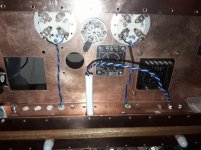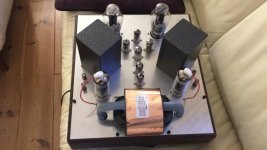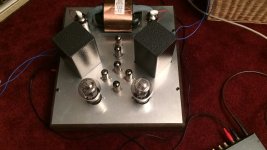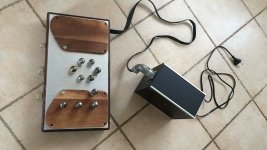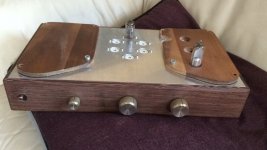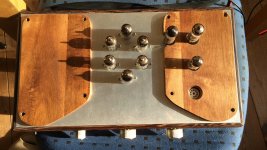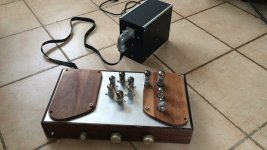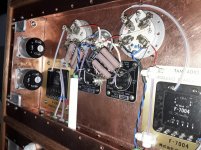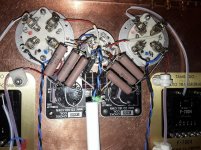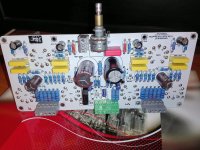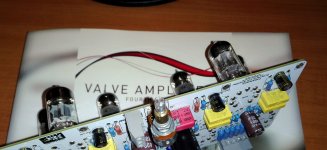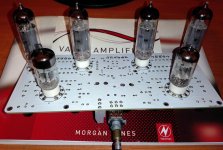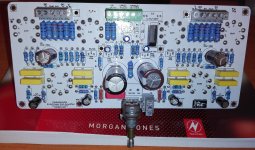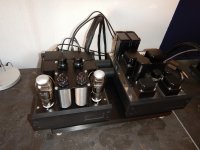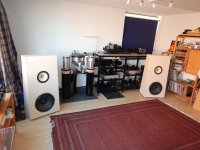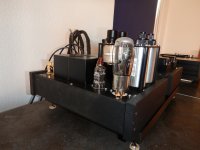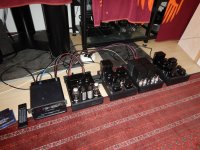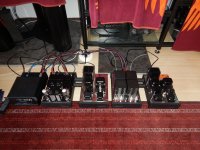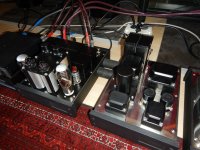Hello,
I will install the anode choke and output transformer for the other channel soon. I will turn the Tamura 180 degrees to have better wiring options ( up to me)
The isolated wire coming from the point where the negative poles of the capacitors are connected to the copper chassis is not yet installed.
For each channel there are just 4 resistors left to connect and as far as i can see these connections can all be made with the resistors themselves so need to make any wires longer which will also give less soldering joints and easier to make the resistors stay in place.
I should consider the resistors as a wire when finding the best spot to install them so avoid them being close to heater wiring ( ac 6,3 volt for input tube and 7,5 volts DC for output tube) . Also keep them at distance from the Tamura output wires.
Greetings, Eduard
I will install the anode choke and output transformer for the other channel soon. I will turn the Tamura 180 degrees to have better wiring options ( up to me)
The isolated wire coming from the point where the negative poles of the capacitors are connected to the copper chassis is not yet installed.
For each channel there are just 4 resistors left to connect and as far as i can see these connections can all be made with the resistors themselves so need to make any wires longer which will also give less soldering joints and easier to make the resistors stay in place.
I should consider the resistors as a wire when finding the best spot to install them so avoid them being close to heater wiring ( ac 6,3 volt for input tube and 7,5 volts DC for output tube) . Also keep them at distance from the Tamura output wires.
Greetings, Eduard
Attachments
Ukrainian monoblocks
I wonder did they misspelled Sound on purpose?
Producing valve amplifiers and vinyl correctors myself.
Check out my recent amplifier - 2x5w.



More technical details:
The amplifier is assembled according to the original circuitry.
The feature is the absence of transition elements between the driver and the output lamp, the absence of carbon resistors.
The current from the level regulator flows only through the metal, the output transformers of the compact series on a thin twisted magnetic circuit, the power transformer on a high-quality core provides anode and glow voltage of the sound lamps and kenotron, a smooth increase in the anode voltage does not allow the cathodes of sound lamps to break down.
ecc84 (6n24p) is used as a driver in ETS output 6p14p (el84), 2x5W output power, sensitivity of 0.25 V, the signal / noise ratio 60 dB, Range 30-20 000Hz frequency at maximum power and 20-20 000Hz at 2W, the load resistance of 2 to 20 Ohms, while maintaining characteristics.
Vinyl corrector assembled according to the scheme with passive correction, in the input stage low-noise pentodes 6zh32 1V input 5mV, separate power supply, background noise at the level of lamps, 60dB

Also made it with low-noise 6s3p triodes, a good idea, the lamp minimally noise at maximum power at the anode, so we use a 2-watt wire resistor as a load.




Also made it with low-noise 6s3p triodes, a good idea, the lamp minimally noise at maximum power at the anode, so we use a 2-watt wire resistor as a load.



New 300b single ended power amp using Tribute transformers. Very clean and dynamic sounding amp.
Very nice arrangement. Well done
New 300b single ended power amp using Tribute transformers. Very clean and dynamic sounding amp.
Does this mean you used conventional low-frequency transformers instead of modulating the sound on a square wave carrier, transforming it with a tiny high-frequency transformer and converting it back to baseband again, like you usually do?
Yes indeed! This because i had these transformers (a gift from a friend of mine). The Tribute transformers have a legendary reputation, so i designed the amp around these. If you get gifts like these then they need to be used in a project, not kept in a box. So i did and it has been fun to build this amp. I must say that this is one of my best sounding amps. Not much power though and some audible hum that i will try to eliminate later. Through the years we collect some nice parts and now with the Corona crisis there is time to build something with these. Never bored...
Best regards,
Best regards,
Thanks! Used natural red tree wood here as box decor.That amp looks amazing!
Yep, right.Just wondering, did you mean RIAA correction with the "vinyl corrector"?
Last edited:
I wonder did they misspelled Sound on purpose?
Producing valve amplifiers and vinyl correctors myself.
Check out my recent amplifier - 2x5w.



More technical details:
The amplifier is assembled according to the original circuitry.
The feature is the absence of transition elements between the driver and the output lamp, the absence of carbon resistors.
The current from the level regulator flows only through the metal, the output transformers of the compact series on a thin twisted magnetic circuit, the power transformer on a high-quality core provides anode and glow voltage of the sound lamps and kenotron, a smooth increase in the anode voltage does not allow the cathodes of sound lamps to break down.
ecc84 (6n24p) is used as a driver in ETS output 6p14p (el84), 2x5W output power, sensitivity of 0.25 V, the signal / noise ratio 60 dB, Range 30-20 000Hz frequency at maximum power and 20-20 000Hz at 2W, the load resistance of 2 to 20 Ohms, while maintaining characteristics.
Nice build, good work.
This was a Dynakit ST-70 built by my uncle in 1964. He used it for many years, and gave it to me sometime in the late 80s. A few years ago it started to act its age, so I pulled it out of service to give it some love. I stripped it down, gave it a good cleaning, added a new VTA circuit board, all new tubes, upgraded the inputs and speaker jacks, replaced the quad cap, added new power cord, and wired it all back up. I also added the toggle switches for triode/pentode switching, and added an "on" light between the switches to help my wife remember to it off!  This amp sounds awesome!
This amp sounds awesome!
An externally hosted image should be here but it was not working when we last tested it.
An externally hosted image should be here but it was not working when we last tested it.
Last edited:
Philips MRO PT8 preamplifier
Whow, great pictures.
I will never get those pictures with my new preamp ( Philips MRO PT8 preamplifier ) because it's a only a single watt (4V/0,25A) for the main triode: The Philips MRO PT8. That repeater triode is made by many brands under totally different names….
If you're looking for "glowing" pictures check out my 35TG amp ( Eimac 35TG amplifier glows ! ) or the big TB3/1000 ( TB3/1000 is alive ! ("European 833A") ) but the new preamp is from that perspective quite boring....
Not surprisingly because the 1 watt filament of a PT8 (or 3A-107a OR 4019a, ETC) is by definition almost nothing …..except when it is properly heated up and running/doing it's thing.
Really wonderful soundstage, it easily kicked out my trusty Gryphon XT-MC preamp on that topic...…
Currently i'm exploring tube equivalents like the TC03/5 but i know that from the 1930's there are much more usable triodes.
An interesting search for those good old 1 watt filament triodes……
Regards,
Reinout
Whow, great pictures.
I will never get those pictures with my new preamp ( Philips MRO PT8 preamplifier ) because it's a only a single watt (4V/0,25A) for the main triode: The Philips MRO PT8. That repeater triode is made by many brands under totally different names….
If you're looking for "glowing" pictures check out my 35TG amp ( Eimac 35TG amplifier glows ! ) or the big TB3/1000 ( TB3/1000 is alive ! ("European 833A") ) but the new preamp is from that perspective quite boring....
Not surprisingly because the 1 watt filament of a PT8 (or 3A-107a OR 4019a, ETC) is by definition almost nothing …..except when it is properly heated up and running/doing it's thing.
Really wonderful soundstage, it easily kicked out my trusty Gryphon XT-MC preamp on that topic...…
Currently i'm exploring tube equivalents like the TC03/5 but i know that from the 1930's there are much more usable triodes.
An interesting search for those good old 1 watt filament triodes……
Regards,
Reinout
Attachments
Don't worry about quality of pictures ReinoutdV. Your work speaks for itself. Based on your picture I dug into your speaker thread and realize I can have hours of fun reading through your fabulous projects. Oh to hear a system like that!Whow, great pictures.
I will never get those pictures with my new preamp
Reinout
Good afternoon Wlowes, thanks for the nice comment.
Indeed the speakers ( FAST with Feastrex D9NF and Fertin 38EX ) and the turntable ( Caeles-special; an air-bearing turntable ) were big projects as amplifiers are more my comfort zone.
The new PT8 preamplifier is really nice and with 21 kgs quite easy to bring along DIY audio-shows (when the Cornona restrictions are lifted). It will be partnered with the 6C45PP SPUD amp which is based on the same chassis. Pictures of that combo included.
Regards, Reinout
Indeed the speakers ( FAST with Feastrex D9NF and Fertin 38EX ) and the turntable ( Caeles-special; an air-bearing turntable ) were big projects as amplifiers are more my comfort zone.
The new PT8 preamplifier is really nice and with 21 kgs quite easy to bring along DIY audio-shows (when the Cornona restrictions are lifted). It will be partnered with the 6C45PP SPUD amp which is based on the same chassis. Pictures of that combo included.
Regards, Reinout
Attachments
Cool!!. I think fullranges and bass speakers must be in separated boxes.....bass will disturb to fullrange.Whow, great pictures.
I will never get those pictures with my new preamp ( Philips MRO PT8 preamplifier ) because it's a only a single watt (4V/0,25A) for the main triode: The Philips MRO PT8. That repeater triode is made by many brands under totally different names….
If you're looking for "glowing" pictures check out my 35TG amp ( Eimac 35TG amplifier glows ! ) or the big TB3/1000 ( TB3/1000 is alive ! ("European 833A") ) but the new preamp is from that perspective quite boring....
Not surprisingly because the 1 watt filament of a PT8 (or 3A-107a OR 4019a, ETC) is by definition almost nothing …..except when it is properly heated up and running/doing it's thing.
Really wonderful soundstage, it easily kicked out my trusty Gryphon XT-MC preamp on that topic...…
Currently i'm exploring tube equivalents like the TC03/5 but i know that from the 1930's there are much more usable triodes.
An interesting search for those good old 1 watt filament triodes……
Regards,
Reinout
- Home
- Amplifiers
- Tubes / Valves
- Photo Gallery
